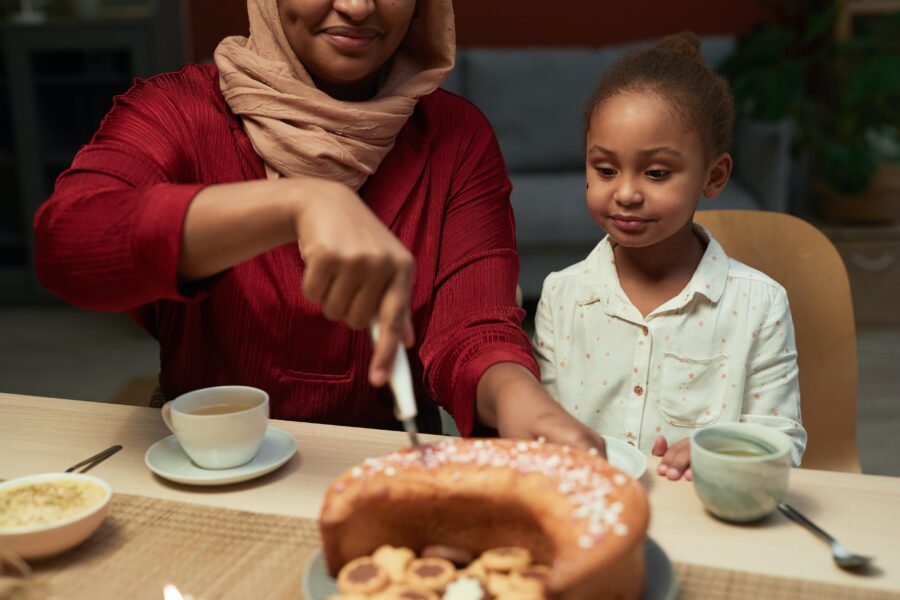Old wives’ tales, family traditions, and routines that are like second nature are embedded in our lives. The way you cuddle your baby, discipline your teenager or feed your family is influenced by your own upbringing. On Parent Mental Health Day, we’re exploring how to break the cycle, and how we can promote better mental health for both parents and their children.
Your own upbringing shapes the way you parent. Whether these habits are carried consciously or unconsciously from one generation to the next, we incorporate them into our own lives. Although many of them may be positive adding to a healthier family dynamic, they may be a few that have a negative influence on your household, impacting mental health.
Before we reflect on ways how we can break those cycles, here’s some examples that have been shared with us on this topic, and experiences of parents who have identified those habits and worked to change them.
A sister who is a mum of three shares her example: “I always like to remind my children that I love them, and show them affection. Growing up we weren’t cuddled or told we were loved that often. I’m glad I’ve changed that.”
“Also telling my child I’m proud of them. That no matter what they’re doing they are enough. As a child, even if I did well, it wasn’t enough, I was made to feel like I could always do better.”
Another parent highlights identifies their upbringing and the impact they had. “As a family we avoided difficult conversations. It often went unspoken, and we didn’t address it. I’ve tried to change that by being open with my own daughter, and encourage her to get her feelings out.
“Showing up for your child is important. Being there for them when they’re in need, and making sure they’re aware of them. I didn’t have that as much I’d liked, and I do my best to do that for my own daughter.’
Having generational habits which you’ve identified and try to break is familiar to everyone. Here are a few ways you can reflect and break the cycle with your own parenting style.
These changes don’t happen overnight, but being aware of them begins the journey and sets the tone for the future.

1. Look back – Reflect on your own childhood
You can only recognise generational habits when you ponder on your own childhood. Identify both positive and negative experiences of your upbringing and what you experienced. Take a deeper look to gain an understanding of what made you feel empowered, loved and heard, and other experiences which may not have.
Alongside the positive experiences, reflect on how you were disciplined, the boundaries that you had and the influences that surrounded you. Ask yourself if they worked for you, and what you would implement or change for your own children.
Take into consideration the generation you were raised in. The changes to the society and world we live in and adjust accordingly.
2. Look inwards – Recognise your patterns
It’s difficult to look inwards, but it’s crucial when you’re trying to recognise your patterns. Take a step back and think about your own parenting style. Ponder on these questions to identify them:
- What’s your behaviour like when you parent?
- Are there any patterns you can identify?
- Are there any habits or responses that seem familiar?
By sitting with these questions over a few hours, days or weeks, whilst simultaneously comparing it your own upbringing, you will begin to identify the patterns. Doing this is crucial to taking the next step to working on breaking the cycle.

3. Ask others – Seek feedback
For a deeper layer of reflection, or if you’re finding it difficult to do your own analysis, ask others around you to give you feedback on your parenting style. It may be a sensitive topic but it can be delivered in a thoughtful and constructive way.
You can ask your loved ones, family, friends, or a co-parent or spouse. Those who see and witness your parenting styles. Asking different people will offer different perspectives, and allow you to build a more well-rounded picture of how your generational habits are building a positive or negative environment for your family.
4. Explore Positive Parenting
Whether you’re interested in parenting, a new parent, or have been a parent for a while, it’s never too late or too early to adapt or learn a parenting style. As mentioned earlier, these changes do not happen miraculously but there’s no time limit on when you can improve or adjust.
There’s plenty of resources out there on positive parenting styles, be it a video, a book, a course or even a parenting group. There will be different variations that can fit your lifestyle based on your own specifications such as age ranges, lifestyle choice and values. Explore these styles, and see what works best for you.
Breaking generational habits doesn’t mean you must completely start afresh and dismiss all the traditions you have. Generational habits and routines can be a beautiful thing, years of stories and love kept sacred, it’s just about identifying those that support a positive environment rather than a negative one.
5. Set goals and communicate
Do not have a personality transplant overnight. Both you, your children and the adults around you will find it difficult to adjust. Set realistic goals, and work step by step to implement those.
It’s not a linear journey and those habits that have stayed in your life for generations will take time to unlearn. Some of the habits we embody, run through us like water, come to us so naturally and will take an extra effort to change. Be patient with yourself and others.
It’s important to speak to your spouse, co-parent or extended family and friends, on your goals, especially for those who are in and around your daily life. It will take time for them to learn to adapt and support your changes.

6. Do it for next generation
Take it slow and check in with yourself and others often. If it helps, journal to process your thoughts and the journey you’re on.
Reflecting on generational habits can be mentally taxing, and remember that, as a parent, you must also prioritise self-care to better care for yourself and your loved ones. Here are a few ways you can practice self-care.
The work you’re doing on your own self, and for your children will change the course of your future and generations to come. By modelling your own behaviour, your children will pick up the habits you exemplify and implement it in the future. Although times will change, and the world around them will be different, there are embedded routines which stay, regardless of circumstances.
By doing the hard work today, you will be able to see your grandchildren, and great grandchildren unlearn the habits you prayed would disappear and revel in the goodness of the positivity you modelled.
To raise a child, it takes a village. Our families are alone in their journey. Raising their children in single-parent households, struggling to cope with the trauma of their experiences and isolated from the community.
Winter is an especially difficult time for them. You can help improve the mental health in their homes by providing them the support they need. GIVE WARM HHUGS.
May Allah bless your parenting with wisdom and love. May He grant us the tawfiq to break negative cycles, guide our children, and make our homes places of peace. Ameen.